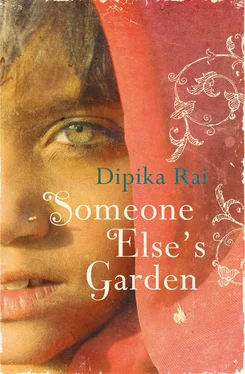Lata Bai circles the air with the thali, dispersing more incense smoke as the flame cavorts in the breeze but doesn’t go out. It is a robust oily flame, culminating in strong, creamy smoke. She looks over her shoulder, Mamta steps forward to take the thali from her mother’s hands. She continues to sing her mother’s song, but she does so very softly. She’s afraid to make an audible mistake. Finally it’s Sneha’s turn. She hands Shanti to her mother and starts with her own smoke circles.
‘Ohm, Ohm, Ohm . . .’ the beginning of the universe. First there was nothing and then there was the cosmic sound Ohm, which manifested Nothing into Everything. Its residue resides in all nature, the sound of the wind, the warmth of sunshine, the blue of the sea, in every heart, in every thought. It is the link to eternity, it will transcend everything, never ending, once sounded always enduring. The mother sings the Gayatri Mantra, the girls join in. The energy is transferred back and forth between the women and they know exactly when to stop together . . . Just like that, there’s silence.
‘This prayer is very important for you, Mamta. Devi is your everything. She will fulfil you and protect you.’ Her mother’s tone is sombre.
‘Let’s see if there are any fingerprints.’
‘Sneha, your head is filled with hay,’ says her mother, but she walks them to the other side of the wall to fulfil their curiosity.
‘Aiee.’ Sneha drops to the ground. Not only are there prints, there are also broken bangles, hundreds of them, lying on the ground. Sneha picks the glass out of her foot. She licks her finger to seal the bleeding wound. Lata Bai sits on a rock to feed Shanti, saying, ‘We should be getting back soon. Your bapu will be wondering.’
‘Amma, so many bangles. Did all their husbands die?’ Soon to join their ranks, Mamta is worried for the fate of all the married women in the world.
‘Must be this Daku business. Some in his gang maybe didn’t want to surrender and went out looting instead. This is the result.’ Lata Bai scours the ground for offerings, picking out discarded spices from far richer plates than hers. She ties the cinnamon, jaggery, cardamom and fennel seed in a ball at the end of her pallav.
‘What will the widows do?’
The mother shrugs.
The women start walking back to the hut. The green and red are upright, the orange bobs up and down all the way, like the float on a fishing line, bouncing unevenly on a wounded foot.
Mamta’s nervousness is a runaway horse. It gathers speed as her mother and sister knead the dough for the chapattis and boil the last of the tea leaves. The mother flavours the tea with offerings from the Red Ruins. ‘Thank you, Devi. Jai ho Devi, Devi jai ho,’ she whispers each time she tosses in a spice.
Mamta needs something to do. She’s twisted the end of her pallav into permanent creases which radiate out to the rest of her sari from the damaged corner like a fan. ‘So what is the first thing I’ll have to do?’
Her mother and sister don’t look up from their work. Sneha has already started on the chillies for the chutney and her hands have started to burn. ‘You’ll get to know by and by.’ Usually her mother loves to talk while cooking, but today is different. Today the weevils are worrying her almost as much as the fact that Jivkant and Ragini haven’t arrived.
‘They will be arriving soon.’ Seeta Ram struggles out of his kurta and puts on a fresh one. The boys stay as they are. They have nothing to change into.
Lata Bai gives Lucky Sister’s gold earrings to Mamta. ‘Put these on.’ Mamta approaches the mirror hanging from the tin door with a length of wire, the family’s only piece of vanity. She can’t see her whole face in it at once any more. The last big wind blew it off the door and left a huge horizontal crack in it. Luckily it didn’t break completely. Her face is divided along the crack, and the two halves don’t match up.
She looks at her lips first. They are her best feature. She turns away from her birthmark sulking like a child might from a disappointing present. The yellowed skin crinkles as she looks closer. She bares her teeth, trying to look even uglier to satisfy some desire to hurt inside. She has started to despair. She replaces the sacred basil sticks in her earlobes with the gold earrings.
‘Now what are you looking at? Haven’t you seen yourself hundreds of times before? Spending all day at the mirror as if you were a great beauty or something!’
‘Stop it, she’s only putting on her earrings. On this one day . . .’
Seeta Ram doesn’t let her finish: ‘Every day is “this one day” where Mamta is concerned. Yours is precisely the kind of useless “love” that spoils girls. See how Sharma’s wife turned out; I bet her mother also gave her some funny ideas. Running away like that. Serves her right. Serves her right, you hear?’ he shouts towards Mamta, pulling the inalienable rules from under the banyan tree into the room. ‘You listen to your man, you hear.’ Next he attacks the mother: ‘What will her husband think? That we’ve sent him someone vain and lazy and old?’
‘Namaste. Namaste.’
Seeta Ram rushes out when he hears his son’s voice greet the guests.
Lata Bai pulls the pallav low over Mamta’s head, covering her whole face and neck. ‘Don’t worry, people have been getting married for thousands of years, it will be fine. Just don’t run away,’ she says half joking, bending beneath Mamta’s veil to smile into her daughter’s eyes.
The women stay indoors. It’s men’s business outside. Mamta’s dowry is piled up on the family’s hay mattress in the centre of the newly flattened courtyard. The dishes reflect a lusty sunset.
She hears her father say, ‘Come, come, my friends,’ hesitating at the word friends, and shouting loudly, ‘Lata, tea!’ with singular authority.
‘They’ve come,’ whispers her mother under her breath, as if it’s a huge surprise that anyone’s turned up at all to partake in her careful preparations. She carries the tea out in tin mugs that the widow Kamla kindly lent her. Her husband doesn’t introduce her and once the hands have grabbed the mugs, she retires inside to be with her daughters.
‘There are four of them. Your husband looks very handsome in his turban. Mamta, you are a lucky girl,’ she says, pulling her daughter towards her. In actual fact, she didn’t look up from serving the tea so she doesn’t know what the groom looks like. Not that she could have seen his face anyway beneath the curtain of slightly bruised jasmine garlands that hung down from his forehead to chin like so many plumb lines. She hopes her lie will ease the pain of separation. Mamta has started to sweat and quiver. Finally the almost-twenty-year-old realises that she might never see her mother and siblings again. Up till now, the wedding has been a game.
‘What’s keeping that damn priest? I gave him the advance he asked for.’ She would never have dared to say this about some other priest, but Pundit Jasraj-feeler-up-of-brides-to-be is undeserving of her reverence. Her mother’s fretting fuels Mamta’s agitation.
Finally Prem brings the message Mamta dreads: ‘The priest is here.’ She hugs her favourite brother for a long time. His presence comforts her.
‘I . . . I . . .’
‘I’ll be there, don’t worry,’ he says. She pulls up her veil and looks into her brother’s eyes, still filled with childlike luminescence. Prem, the boy she looked after when she was only five years old. He would always stop crying for her, and she took him on her hip wherever she went. But today, it is he who is the stronger, easing her nervousness.
Just three steps to a new life, through the door of her hut. Mamta puts one foot in front of the other. She stops in front of the door. Lata Bai kicks it open and pulls her daughter through by her arm. It’s as awkward as being born. The two women pull in different directions. The mother wins. Did the mother pull her daughter through on the day of her birth as well?
Читать дальше












